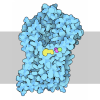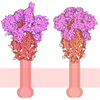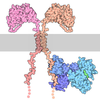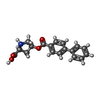[English] 日本語
 Yorodumi
Yorodumi- PDB-7bcs: ASCT2 in the presence of the inhibitor Lc-BPE (position "down") i... -
+ Open data
Open data
- Basic information
Basic information
| Entry | Database: PDB / ID: 7bcs | ||||||||||||||||||||||||
|---|---|---|---|---|---|---|---|---|---|---|---|---|---|---|---|---|---|---|---|---|---|---|---|---|---|
| Title | ASCT2 in the presence of the inhibitor Lc-BPE (position "down") in the outward-open conformation. | ||||||||||||||||||||||||
 Components Components | Neutral amino acid transporter B(0) | ||||||||||||||||||||||||
 Keywords Keywords | MEMBRANE PROTEIN / Solute carrier transporter / homology modeling / cancer metabolism / glutamine deprivation / cryo-EM | ||||||||||||||||||||||||
| Function / homology |  Function and homology information Function and homology informationglutamine secretion / L-glutamine import across plasma membrane / L-glutamine transmembrane transporter activity / glutamine transport / L-serine transmembrane transporter activity / ligand-gated channel activity / neutral amino acid transport / L-aspartate transmembrane transporter activity / L-aspartate import across plasma membrane / neutral L-amino acid transmembrane transporter activity ...glutamine secretion / L-glutamine import across plasma membrane / L-glutamine transmembrane transporter activity / glutamine transport / L-serine transmembrane transporter activity / ligand-gated channel activity / neutral amino acid transport / L-aspartate transmembrane transporter activity / L-aspartate import across plasma membrane / neutral L-amino acid transmembrane transporter activity / Amino acid transport across the plasma membrane / amino acid transmembrane transporter activity / symporter activity / antiporter activity / RHOJ GTPase cycle / RHOQ GTPase cycle / protein homotrimerization / amino acid transport / RHOH GTPase cycle / RAC3 GTPase cycle / transport across blood-brain barrier / RAC1 GTPase cycle / basal plasma membrane / erythrocyte differentiation / centriolar satellite / melanosome / signaling receptor activity / virus receptor activity / ciliary basal body / extracellular exosome / metal ion binding / membrane / plasma membrane Similarity search - Function | ||||||||||||||||||||||||
| Biological species |  Homo sapiens (human) Homo sapiens (human) | ||||||||||||||||||||||||
| Method | ELECTRON MICROSCOPY / single particle reconstruction / cryo EM / Resolution: 3.43 Å | ||||||||||||||||||||||||
 Authors Authors | Garibsingh, R.A. / Ndaru, E. / Garaeva, A.A. / Shi, Y. / Zielewicz, L. / Bonomi, M. / Slotboom, D.J. / Paulino, C. / Grewer, C. / Schlessinger, A. | ||||||||||||||||||||||||
| Funding support |  Netherlands, Netherlands,  United States, 7items United States, 7items
| ||||||||||||||||||||||||
 Citation Citation |  Journal: Proc Natl Acad Sci U S A / Year: 2021 Journal: Proc Natl Acad Sci U S A / Year: 2021Title: Rational design of ASCT2 inhibitors using an integrated experimental-computational approach. Authors: Rachel-Ann A Garibsingh / Elias Ndaru / Alisa A Garaeva / Yueyue Shi / Laura Zielewicz / Paul Zakrepine / Massimiliano Bonomi / Dirk J Slotboom / Cristina Paulino / Christof Grewer / Avner Schlessinger /    Abstract: ASCT2 (SLC1A5) is a sodium-dependent neutral amino acid transporter that controls amino acid homeostasis in peripheral tissues. In cancer, ASCT2 is up-regulated where it modulates intracellular ...ASCT2 (SLC1A5) is a sodium-dependent neutral amino acid transporter that controls amino acid homeostasis in peripheral tissues. In cancer, ASCT2 is up-regulated where it modulates intracellular glutamine levels, fueling cell proliferation. Nutrient deprivation via ASCT2 inhibition provides a potential strategy for cancer therapy. Here, we rationally designed stereospecific inhibitors exploiting specific subpockets in the substrate binding site using computational modeling and cryo-electron microscopy (cryo-EM). The final structures combined with molecular dynamics simulations reveal multiple pharmacologically relevant conformations in the ASCT2 binding site as well as a previously unknown mechanism of stereospecific inhibition. Furthermore, this integrated analysis guided the design of a series of unique ASCT2 inhibitors. Our results provide a framework for future development of cancer therapeutics targeting nutrient transport via ASCT2, as well as demonstrate the utility of combining computational modeling and cryo-EM for solute carrier ligand discovery. #1:  Journal: Biorxiv Journal: BiorxivTitle: Structural basis for stereospecific inhibition of ASCT2 from rational design Authors: Garibsingh, R.A. / Ndaru, E. / Garaeva, A.A. / Shi, Y. / Zielewicz, L. / Bonomi, M. / Slotboom, D.J. / Paulino, C. / Grewer, C. / Schlessinger, A. | ||||||||||||||||||||||||
| History |
|
- Structure visualization
Structure visualization
| Movie |
 Movie viewer Movie viewer |
|---|---|
| Structure viewer | Molecule:  Molmil Molmil Jmol/JSmol Jmol/JSmol |
- Downloads & links
Downloads & links
- Download
Download
| PDBx/mmCIF format |  7bcs.cif.gz 7bcs.cif.gz | 420.2 KB | Display |  PDBx/mmCIF format PDBx/mmCIF format |
|---|---|---|---|---|
| PDB format |  pdb7bcs.ent.gz pdb7bcs.ent.gz | 348 KB | Display |  PDB format PDB format |
| PDBx/mmJSON format |  7bcs.json.gz 7bcs.json.gz | Tree view |  PDBx/mmJSON format PDBx/mmJSON format | |
| Others |  Other downloads Other downloads |
-Validation report
| Summary document |  7bcs_validation.pdf.gz 7bcs_validation.pdf.gz | 1.3 MB | Display |  wwPDB validaton report wwPDB validaton report |
|---|---|---|---|---|
| Full document |  7bcs_full_validation.pdf.gz 7bcs_full_validation.pdf.gz | 1.3 MB | Display | |
| Data in XML |  7bcs_validation.xml.gz 7bcs_validation.xml.gz | 43.8 KB | Display | |
| Data in CIF |  7bcs_validation.cif.gz 7bcs_validation.cif.gz | 64.5 KB | Display | |
| Arichive directory |  https://data.pdbj.org/pub/pdb/validation_reports/bc/7bcs https://data.pdbj.org/pub/pdb/validation_reports/bc/7bcs ftp://data.pdbj.org/pub/pdb/validation_reports/bc/7bcs ftp://data.pdbj.org/pub/pdb/validation_reports/bc/7bcs | HTTPS FTP |
-Related structure data
| Related structure data |  12142MC  7bcqC  7bctC C: citing same article ( M: map data used to model this data |
|---|---|
| Similar structure data |
- Links
Links
- Assembly
Assembly
| Deposited unit | 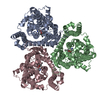
|
|---|---|
| 1 |
|
- Components
Components
| #1: Protein | Mass: 56638.902 Da / Num. of mol.: 3 Source method: isolated from a genetically manipulated source Source: (gene. exp.)  Homo sapiens (human) / Gene: SLC1A5, ASCT2, M7V1, RDR, RDRC / Production host: Homo sapiens (human) / Gene: SLC1A5, ASCT2, M7V1, RDR, RDRC / Production host:  Komagataella pastoris (fungus) / References: UniProt: Q15758 Komagataella pastoris (fungus) / References: UniProt: Q15758#2: Chemical | Has ligand of interest | Y | |
|---|
-Experimental details
-Experiment
| Experiment | Method: ELECTRON MICROSCOPY |
|---|---|
| EM experiment | Aggregation state: PARTICLE / 3D reconstruction method: single particle reconstruction |
- Sample preparation
Sample preparation
| Component | Name: ASCT2 in the presence of the inhibitor Lc-BPE / Type: COMPLEX / Entity ID: #1 / Source: RECOMBINANT |
|---|---|
| Source (natural) | Organism:  Homo sapiens (human) Homo sapiens (human) |
| Source (recombinant) | Organism:  Komagataella pastoris (fungus) Komagataella pastoris (fungus) |
| Buffer solution | pH: 7.4 / Details: 20 mM Tris-HCl, pH 7.4, 200 mM NaCl |
| Specimen | Conc.: 1 mg/ml / Embedding applied: NO / Shadowing applied: NO / Staining applied: NO / Vitrification applied: YES |
| Specimen support | Details: at 5mA / Grid material: GOLD / Grid mesh size: 300 divisions/in. / Grid type: Quantifoil R1.2/1.3 |
| Vitrification | Instrument: FEI VITROBOT MARK IV / Cryogen name: ETHANE-PROPANE / Humidity: 100 % / Chamber temperature: 288 K |
- Electron microscopy imaging
Electron microscopy imaging
| Experimental equipment | 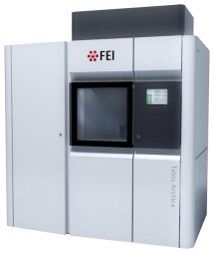 Model: Talos Arctica / Image courtesy: FEI Company |
|---|---|
| Microscopy | Model: FEI TALOS ARCTICA |
| Electron gun | Electron source:  FIELD EMISSION GUN / Accelerating voltage: 200 kV / Illumination mode: FLOOD BEAM FIELD EMISSION GUN / Accelerating voltage: 200 kV / Illumination mode: FLOOD BEAM |
| Electron lens | Mode: BRIGHT FIELD / Nominal magnification: 130000 X / Calibrated magnification: 49407 X / Nominal defocus max: 2000 nm / Nominal defocus min: 300 nm / Calibrated defocus min: 300 nm / Calibrated defocus max: 2000 nm / Cs: 2.7 mm / C2 aperture diameter: 100 µm / Alignment procedure: COMA FREE |
| Specimen holder | Cryogen: NITROGEN / Specimen holder model: FEI TITAN KRIOS AUTOGRID HOLDER / Temperature (max): 105 K / Temperature (min): 90 K |
| Image recording | Average exposure time: 9 sec. / Electron dose: 53 e/Å2 / Detector mode: COUNTING / Film or detector model: GATAN K2 SUMMIT (4k x 4k) / Num. of grids imaged: 3 / Num. of real images: 6233 |
| EM imaging optics | Energyfilter name: GIF Bioquantum / Energyfilter slit width: 20 eV |
| Image scans | Width: 3838 / Height: 3710 / Movie frames/image: 60 / Used frames/image: 1-60 |
- Processing
Processing
| Software | Name: PHENIX / Version: 1.18.2_3874: / Classification: refinement | ||||||||||||||||||||||||||||||||||||||||||||||||||
|---|---|---|---|---|---|---|---|---|---|---|---|---|---|---|---|---|---|---|---|---|---|---|---|---|---|---|---|---|---|---|---|---|---|---|---|---|---|---|---|---|---|---|---|---|---|---|---|---|---|---|---|
| EM software |
| ||||||||||||||||||||||||||||||||||||||||||||||||||
| CTF correction | Type: PHASE FLIPPING AND AMPLITUDE CORRECTION | ||||||||||||||||||||||||||||||||||||||||||||||||||
| Particle selection | Num. of particles selected: 3666842 | ||||||||||||||||||||||||||||||||||||||||||||||||||
| Symmetry | Point symmetry: C3 (3 fold cyclic) | ||||||||||||||||||||||||||||||||||||||||||||||||||
| 3D reconstruction | Resolution: 3.43 Å / Resolution method: FSC 0.143 CUT-OFF / Num. of particles: 300899 / Algorithm: BACK PROJECTION / Symmetry type: POINT | ||||||||||||||||||||||||||||||||||||||||||||||||||
| Atomic model building | Space: REAL | ||||||||||||||||||||||||||||||||||||||||||||||||||
| Atomic model building | PDB-ID: 6MPB Accession code: 6MPB / Source name: PDB / Type: experimental model | ||||||||||||||||||||||||||||||||||||||||||||||||||
| Refine LS restraints |
|
 Movie
Movie Controller
Controller



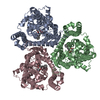
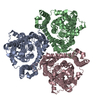



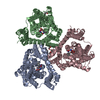
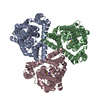
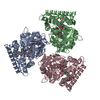
 PDBj
PDBj